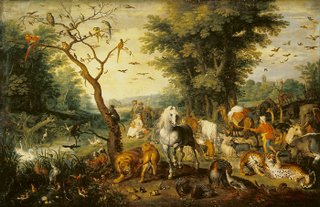OK, pop quiz. How many of each animal did Noah bring on the ark?

---------
The answer depends a little on where you look. In Gen 6:19-20, God tells Noah to bring two of each kind of animal. Then, in Gen 7:2-3, it's seven apiece of clean animals (cats, one often hears, are very clean animals) and two apiece of unclean animals. Then, in the footnotes, my particular Bible says that seven probably means seven pairs.
Did you know about this? It's a big surprise to me. Two is such a, um, intuitive number of species-preserving animals to pack for a long trip. Seven (or fourteen), although definitely superior from a genetic-diversity point of view, seems kind of random.
The Flood
OK, one of the key questions I'm wrestling with in these scribblings is "Is God good?" Since the mere posing of this question suggests the possibility of judgement, and of a finding in the negative, an immediate corrolary question is "What if God isn't good, huh? What then, wiseass?"
And indeed, what then? Is it right, in the face of a universe-creating power, to merely gape in awe, to live as it were in dread of God? If one feels that God has misbehaved, should one mention this to him? Is it polite? Is it safe? How about mentioning it in a blog? Is that a one-way ticket to eternal damnation? Hope not.
There is the school of thought, of course, that God and good are inseperable concepts, and that if God did it, it must be right. We are quite incapable of outthinking God, the reasoning runs -- have some humility in the face of a power that is infinitely, unthinkably greater than yourself, and give the back-seat driving a rest.
And actually, this arguement makes a certain amount of sense to me, intellectually. But, for better or worse, I've never been able to turn off the facility of judgement that I was somehow (ahem) created with. If I am indeed a product of God, he made something with the (insignificantly tiny) ability to talk back. If he doesn't like it, he has no one to blame but himself.
I bring this up because the Flood seems a bit excessive for my tastes. To be fair, we aren't told just what humans were up to that so irked God -- just that the Lord saw how great man's wickedness on the Earth had become, and that every inclination of the thoughts of his heart was only evil all the time (6:5). Or, to say it circularly: God saw how corrupt the earth had become, for all the people on earth had corrupted their ways (6:12).
One specific is given: people are full of violence (6:11). So, God decides that I am going to put an end to all people, for the earth is filled with violence because of them. I am surely going to destroy both them and the earth (6:13).
Talk about circular. Humans are violent -- so God decides to waste 'em. The earth is tainted by human violence -- so God is going to smash it to bits. As a moral statement, this seems neither consistant nor coherent, and frankly I was hoping for better leadership. God seems to be operating here with the logic of petulant children and dangerous drunks.
Or, maybe that is only true if you presuppose that humans are morally significant in God's eyes. Without that assumption, from the dread-of-God perspective, God's decision could be as utilitarian as a carpenter saying "damn, this 2 x 4 is infested with termites. Into the burn-barrel it goes." ("...except for this one cute little termite, I'll spare him...")
Anyway....
God as Republican shows up again in Genesis 9, which begins with another restatement and amplification of the now-familiar "everything on Earth belongs to you humans, knock yourself out" speech (1-3). Immediately following this is an absolutely cut-and-dry mandate for the death penalty: whoever sheds the blood of man, by man shall his blood be shed, for in the image of God has God made man (9:6).
Family values are not addressed as such in this section -- although, wait 'til next week -- but there is a passing condemnation of humanity that is a bit stinging in its casualness: The Lord smelled the pleasing aroma (Mmmm! burnt sacrifice!) and said in his heart: "Never again will I curse the ground because of man, even though every inclination of his heart is evil from childhood. (9:21)" Ouch!
The Afterlife has been mentioned in these very key first nine chapters of the Bible.... not at all!
Details, Details....
The Noah story is really the first so far that is long enough to have any real narrative line. The most charming thing about it as a story is the wild inconsistancy of detail. In places, there is sudden abundance of precision -- the dimensions of the boat, the exact day of Noah's life on which it started raining, and the elaborate process of releasing birds to search for dry land. Of other areas that spark a readers interest -- what is is like to live on a boat for hundreds of days with only your immediate family and the Bronx Zoo for company? what did people do to deserve this, that we might avoid making the same mistakes in the future? was the rise in water level concomitant with sudden dramatic melting of the Antarctic and Greenland ice sheets? -- there is not a word.
Then, there is a nice piece of poetry that ends Genesis 8 on a hopeful note. The floodwaters receding, God is pleased by Noah and his family, and decides that one destruction of the world is enough:
As long as the earth endures,seedtime and harvest,
cold and heat,summer and winter,day and nightwill never cease. (8:22)
NEXT: "The Tower of Babel," or, Nxhggl mnzzch gilllm ba fortiax!

